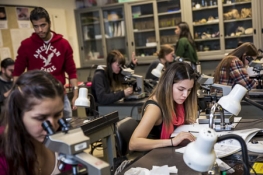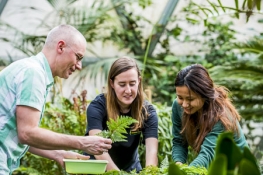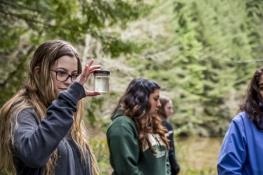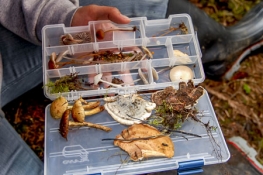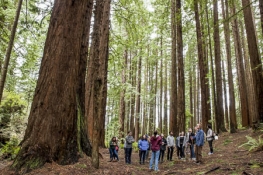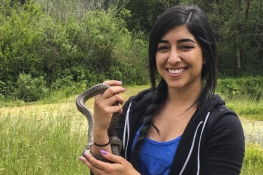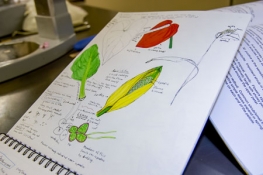Terry Henkel Ph.D.
Professor - Botany
Terry grew up in Ohio and received his BSc in Botany from Ohio University, MSc in Botany from the University of Wyoming, and PhD in Botany from Duke University.
Specialty Area
Systematics, ecology, and biogeography of tropical macrofungi; tropical rainforest ecology.
Education
Courses Taught
Research
Mycology is a mainstay of the Humboldt Botany Program with courses in mycology, forest pathology, and mushroom identification. My research investigates macrofungal biodiversity and ecological relationships in the remote tropical rainforests of South America's Guiana Shield and the Guineo-Congolian region of Central Africa. My lab also examines the overlooked but important roles that native forest pathogenic fungi have in shaping forest communities in northern California.
Publications
Recent Publications
Mighell KM, Henkel TW, Koch RA, Chin ML, Brann M, Aime MC. 2020. Amanita in the Guineo-Congolian rainforest: new species and epitypes from the Dja Biosphere Reserve, Cameroon. Mycologia: DOI: 10.1080/00275514.2020.1816386. PDF.
- Henkel TW, Ryvarden L. 2020. Aphyllophorales of Africa 37. Notes on the genus Plicatura. Synopsis Fungorum 40: 106-108.
- Henkel TW, Mayor JR. 2019. Implications of a long-term mast seeding cycle for climatic entrainment, seedling establishment, and persistent monodominance in a Neotropical, ectomycorrhizal canopy tree. Ecological Research 34: 472-484. PDF
- ter Steege H, Henkel TW, Helal N, Marimon BS, Marimon BH….and 210 others. 2019. Rarity of monodominance in hyperdiverse Amazonian forests. Nature Scientific Reports: DOI:10.1038/s41598-019-50323-9. PDF
- Largent DL, Henkel TW, Siegel N, Séné O, **Hageman KM, Koch RA, Aime MC. 2019. New species of Entolomataceae from Cameroon. Fungal Evolution and Systematics: DOI: 10.3114/fuse.2020.05.10. PDF
- *Mighell KS, Henkel TW, Koch RA, Goss A, Aime MC. 2019. New species of Amanita subgen. Lepidella from Guyana. Fungal Evolution and Systematics 3: 1-12. PDF
- Buyck B, Henkel TW, Hofstetter V. 2019. Epitypification of the Central African Cantharellus densifolius and C. luteopunctatus allows for the recognition of at least two additional species. MycoKeys 48: 49-72. PDF
- Corrales A, Henkel TW, Smith ME. 2018. Ectomycorrhizal associations in the tropics – biogeography, diversity patterns, and ecosystem roles. New Phytologist 220: 1076–1091. PDF
Graduate Students
Current:
Sarah Norvell (2020-): Lichen diversity of the Horse Mountain Botanical Area, Six Rivers National Forest, CA.
Caitlyn Allchin (2020-):Conservation biology of the endangered Lassic lupine, a California serpentine-endemic.
Former:
Jordan Mayor (2004-05): Ectomycorrhizal influence on leaf litter decomposition in monodominant tropical forests of Guyana.
Lance Woolley (2005-06): Reiteration in the monodominant tropical tree Dicymbe corymbosa (Caesalpiniaceae) and its potential adaptive significance.
Tara Fulgenzi (2007-09): Systematic studies on Boletaceae (Basidiomycota) of Guyana.
Ashley Hawkins (2007-09): Forest pathogen dynamics in old-growth mixed coniferous forests of the Coast Range, Northern California.
Jessie Uehling (2010-2012): Systematics and molecular ecology of Cantharellales from the Guiana Shield.
Arthur Grupe II (2014-2016): Systematics of Neotropical species of Sarcodon (Bankeraceae, Thelephorales).
Carolyn Delevich (2016-19):Ectomycorrhizal fungal community assembly on seedlings of a Neotropical monodominant tree.
Kennan Mighell (2016-2020): Systematics of tropical Amanitaceae.


